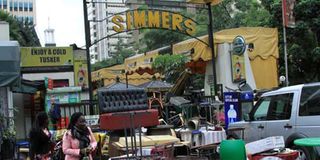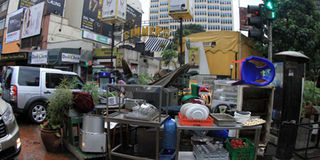
Ruins of the once popular Simmers Bar and Restaurant, Nairobi.
For more than two decades, Simmers Bar and Restaurant, nestled at the bustling intersection of Kenyatta Avenue and Muindi Mbingu Street, was more than just an eatery, it was an icon of Nairobi’s entertainment scene.
Operated by former Kimilili MP Suleiman Murunga, Simmers captured the pulse of the city, where Nairobi’s vibrant spirit came alive and the clash between old money and new riches unfolded.
At its peak, Simmers was a melting pot of cultures and aspirations, offering a stage for the soulful strains of Rumba to weave their magic. It became a key Nairobi venue where Congolese rhythms bridged international borders, drawing revellers from all walks of life into its hypnotic embrace.
The entrance to Simmers Bar was a vibrant splash of Tusker-branded colours, offering a fitting gateway to one of Nairobi’s most iconic hangouts. To the left, an open-air nyama choma grill enticed revellers with the tantalizing aroma of sizzling meat.

Once popular Simmers Restaurant in Nairobi before it was demolished.
For over two decades, Simmers never truly closed, not only because of a round-the-clock schedule, but also because there was no door to close. It was a perpetual hub of life, laughter, and live music, where the pulsating beats of Congolese Rumba set the tone for endless nights of revelry.
Simmers also became the unofficial annex of the nearby 680 Hotel, drawing its clientele with a promise of something more-- girls, lively football screenings, and a dance floor alive with energy. It was a place where Nairobi’s nightlife flourished, a melting pot of culture and entertainment that defined the city’s after-dark identity.
Yet, beneath the exuberance, a storm brewed. Simmers was at the center of a high-stakes land dispute, a microcosm of Nairobi’s turbulent land ownership sagas. The family of former Finance Minister Arthur Magugu waged a fierce legal battle to reclaim the prime plot, locked in a clash with Nairobi businessman Madatali Hashan Abraham – the pioneer owners.
By day, Simmers, as it was simply known, was a bustling haven for Nairobi’s middle class, dishing out sumptuous lunchtime feasts.
The menu, a blend of tradition and modernity, featured everything from the beloved nyama choma to more contemporary culinary offerings. Lunchtime meetings often melted into lingering drinking sessions, blurring the lines between lunch breaks, business and leisure.
As the sun dipped below the horizon, the scene transformed. Beneath the tents and along the street corners emerged the twilight girls-- figures who hovered, lingered, and sought their evening fortunes among the crowd.
Simmers, however, was neither a brothel nor a moral pulpit. It straddled the complex duality of Nairobi nightlife, where revelers, tipsy with joy and life, danced into the wee hours under the neon glow of the city. Taxi drivers made their kill and revellers vanished into the night.
In its duality lay its charm. Simmers was not just an establishment; it was an institution. A place where stories were spun, friendships born, and the vibrant rhythm of Nairobi’s nightlife took on a life of its own. Its name graced tourist brochures as a must-visit cultural landmark, forever entwined with the city’s identity and the unbridled spirit of its nights.
From 1997, Simmers had live bands – both local and regional and they offered a mixture of Benga, Rhumba and some Soukouss until the club was demolished on March 3, 2018, when Murunga was finally evicted by County Askaris under the supervision of Nairobi Governor Mike Sonko.
Murunga was a seasoned operator and a master of political intrigue but, in Sonko, he seemed to have met his match. Again, he was no stranger to backroom dealings. When he secured a lease for a prime parcel of land, L.R. Number Nairobi/209/918, from Nilestar Holdings in 1997, he knew that only twelve years were remaining on its 99-year tenure.
It seems Murunga had keenly anticipated this expiry and stealthily maneuvered within Ardhi House’s dungeons of sleaze to position himself as the next owner of the plot.
It was a scheme well known in Nairobi where expiring leases, especially those owned by Asian families, were targeted by the new Mr Moneybags.
Sonko had always identified with Asian families that were losing properties under the guise of expired leases.

People walk around Simmers Bar and Restaurant, Nairobi, after it was demolished on March 3, 2018. PHOTO | JEFF ANGOTE | NATION MEDIA GROUP
Simmer’s land wasn’t without its own tangled history. It was legally owned by Green Valley Limited, a company tied to Magugu, and Madatali Hashan Abraham. As their respective families clashed in court over the shareholding of Nilestar Holdings, Murunga was orchestrating his own scheme to claim the prize.
The Magugu and Madatali tussle went back to between 1986 and 1987 when Magugu sought to buy Nilestar shares for Sh25 million. Nilestar owned the Simmers property as its only asset.
It was said that Magugu paid Sh19 million as part of the agreement, but a disagreement arose. In 1996, there was another agreement in which the three Nilestar shareholders agreed to sell and transfer their shares to Magugu’s Green Valley Limited for Sh184 million ($1.4 million). That sum was to include the previous Sh19 million which Magugu had paid.
It was claimed that Green Valley paid Sh22.1 million ($170,000) and were prepared to pay the balance of $ 1.23 million to complete the transaction.
The Mandatali family then invoked the forfeiture clause and sought to rescind the purchase and forfeit all the money paid by Magugu – thus triggering the court case.
As the tussle continued, Murunga rented the premises, giving Nairobi a new taste of music – and a place to make merry. But he was also a strategic opportunist.
During this period, Magugu’s family filed a notice of motion seeking to block the government from renewing the lease to Nilestar—pending the resolution of a suit on the ownership.
Nilestar had applied to the Commissioner of Lands for a 99-year lease renewal. By this time, Mandatali was 90 years old, and Magugu, having suffered a stroke, was in poor health.

Popular Simmers bar and restaurant closed and property removed from the premises on March 2, 2018. PHOTO | JEFF ANGOTE | NATION MEDIA GROUP
Amidst the uncertainty, Murunga applied to the Commissioner of Lands for allocation of the plot and in 2011 his efforts paid off: he was officially given a letter of allotment.
It meant that he was a step away from owning the plot. This development compelled Nilestar and Green Valley to negotiate a settlement and file the same in court. Divided, they realised their disunity could lead to losing the property to Murunga, whose allotment letter from the National Lands Commission positioned him as a formidable contender.
Soon, the iconic Simmers Bar, once merely a tenant on the land, could stand on Murunga’s acquired domain. The only hurdle remaining to complete Murunga’s mischief was the issuance of a certificate of lease or a title deed. Without these, Murunga’s legal claim to the property remained tenuous – as the court later held.
In court, Murunga argued that Nilestar’s lease had expired on December 31, 2009, and that its renewal request had been declined by the Commissioner of Lands. It was not the truth.
Finally, neither Murunga nor Simmers survived the battle. His eviction was the dramatic end of an iconic establishment which had brought joy to Nairobi revellers and pain to the Magugu and Mandatali families.
Simmers was more than a bar; it was a crossroads of music, cultures, money, and power.












